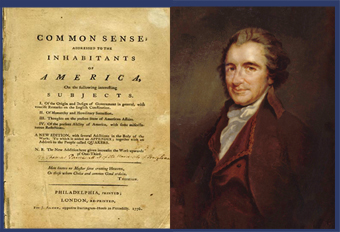
Images courtesy of Stanford University Library & Archives
The Great American Revolutionary
By Earl H. Perkins | published Friday, December 13, 2013 |
Thursday Review Associate Editor
"At his funeral no pomp, no pageantry, no civic procession, no military display. In a carriage, a woman and her son who had lived on the bounty of the dead on horseback, a Quaker, the humanity of whose heart dominated the creed of his head and, following on foot, two negroes filled with gratitude constituted the funeral cortege of Thomas Paine." --writer and orator, Thomas G. Ingersoll
The fiery heart that stoked the fire of the Revolutionary War could finally receive some semblance of peace, according to the Associated Press. Following his death in 1809, Paine's writings, personal effects and his body were scattered to the winds. Iona College in the New York City suburbs has now become home to the Institute for Thomas Paine Studies.
"I'm just delighted," said Martin Levitt, library director at the American Philosophical Society in Philadelphia, which also houses a world-class Paine collection. "Paine is the most misunderstood of the Founding Fathers, sort of the black sheep, and making more of his lifetime work available to scholars is going to be a tremendous improvement."
Approximately 300 pieces have been gathered since 1884 by the Thomas Paine National Historical Association, and they're available to students, scholars and the public in rotating displays in the climate-controlled Ryan Library, little more than a mile from where Paine lived. Funding and improper storage had caused the collection to be almost lost, but Paine enthusiasts and Iona's Irish history scholars banded together and received court approval to form the institute.
"It was just serendipitous," said Brad Mulkern, the association's president and executive director. "Before, I was heartbroken. Now, I couldn't be happier. It's a win for the community, it's a win for Iona and it's a win for Thomas Paine."
Paine is known as the father of the American Revolution, penning the book Common Sense, which advocated colonial America's independence from Great Britain. Americans were also inspired by his highly-influential pro-revolutionary pamphlet series The American Crisis. However, Paine was truly a revolutionary at heart, which helped cause him to be ostracized and reviled for approximately two centuries.
He went to France and helped persuade the French Crown to part with enough money to float the American revolution, and his writings inspired massive amounts of volunteers for the Continental Army. Ironically, the French then had little money to run their own empire. Paine then wrote the Rights of Man, vociferously laid out a defense of the French Revolution. Paine's popularity continued to plummet as he denounced organized religion, American slavery, George Washington and Federalism. He was also one of the earliest and most influential voices to decry slavery in America, helping found the New World's first anti-slavery society. And the US Social Security Administration claims Paine's Agrarian Justice pamphlet was the first American proposal for an old-age pension.
More than two hundred years have passed, but people are still arguing about Paine's thoughts and his legacy. I'm not saying he had it coming, but he has certainly been treated shabbily, even in death. His body was dug up and the bones were lost, and his gravesite was paved over. A coin was minted depicting him in a noose, he lost his right to vote, political cartoonists lampooned him and he was almost put to death in France.
However, many of America's great thinkers were inspired by the words and philosophies of Paine, including those of Abraham Lincoln and Thomas Edison.
